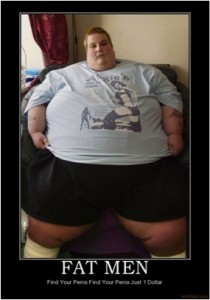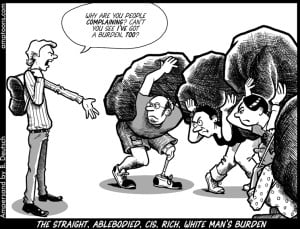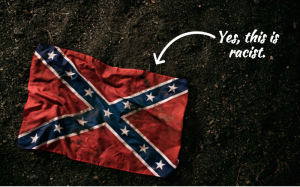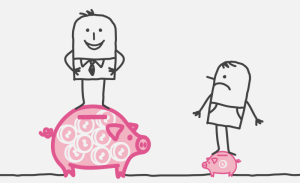I’ve often been asked about my opinions or politics surrounding fat men.
And the truth is: I have long hesitated to speak on this issue – despite its significance – for two reasons:
1. My background and expertise lie in the study and advocacy of women; and
2. I hadn’t dedicated enough time to working out my ideas around the way that fatphobia affects men, especially considering that I feel that fatphobia is so heavily mediated by gender.
Fatphobia in so many ways is about hating and policing women and our bodies, but what I’ve realized recently is that in some ways, the fatphobia that fat men experience is also a result of misogyny.
In researching for this article, I found that fat men are often perceived as feminine.
Fat men are often perceived as possessing “looser morals” or less discipline, traits historically ascribed to women and femininity.
I also found many themes that pointed to fatphobia toward men, at its roots, being about anxiety that men were becoming woman-like.
So, I believe that it is sexism and the deep cultural hatred of the feminine – not the hatred of men who are fat, per se – that leads to some (or possibly many) of the instances of fatphobia that men experience.
In reviewing images and articles related to fat men online, there were three major themes that struck me:
1. Chemical Feminization
Even Dr. Oz is worried that men’s belly fat “increases the conversion of testosterone into estrogen.”
In this Salon article (entitled Sex Researchers: ‘Size’ Does Matter with the included quip, “Study shows that fatter men last longer in bed. Should Americans rejoice?”), Judy Mandelbaum writes (emphasis mine):
“Men with excess fat showed higher levels of the female estradiol sex hormone. This substance apparently disrupted their bodies’ natural ‘male’ neurotransmitter chemicals and slowed their progression towards orgasm. Ironically, the less masculine their bodies appeared, the better lovers they proved to be.”
There is every imaginable kind of wrong in this excerpt.
First, I know it’s considered common knowledge that hormones determine sex-specific behavior like aggression in men and domesticity in women (or the length of a sex act).
I’m in the minority of scholars who argue that this kind of “hormonal determinism” is problematic, if not entirely wrong.
Mendelbaum draws potentially specious lines between the extended act of sex and the increased presence of estrogen in fat men when it’s difficult to make that connection.
Note the word “apparently” in this excerpt, which holds no explanatory value whatsoever.
Though the facts are correlated, it doesn’t mean that one causes the other.
There are myriad possible factors that affected these findings: One that comes to mind could be increased self-consciousness in fat men, which can affect the time needed to reach orgasm.
Because fat people have been taught that our bodies are wrong and unattractive, I’ve found that self-consciousness can be a major factor in achieving orgasm during sex.
As a fat woman, I have more fat cells, and fat cells store hormones, and therefore I may have more both more estrogen and more testosterone in my body than a thin woman.
I don’t see the potentially increased presence of hormones in my body affecting my orgasm as much as I see self-awareness around my fat body affecting my orgasm.
When I’m with partners who make me feel emotionally safe, I have no problem achieving incredible orgasms in short periods. Though I can’t make the claim that the same is true for the men who participated in the abovementioned study, I think this is an important potential confounding factor.
Second, and perhaps more importantly, the author is using a supposed scientific argument to posit that fat men both physically and chemically resemble women.
The idea that men’s bodies appear “less masculine” the fatter they are has nothing to do with science (or hormones), and everything to do with the author’s fat-negative bias.
Though what’s important to notice about her fatphobia is that she draws lines between gender presentation and fatness.
Her statement calls into question the gender and virility of fat men, a tool that is based in the cultural understanding that for a man to be perceived in any way as woman-like is a source of shame.
2. Fat Castration
In searching images and articles on fat men, a popular meme related to fat men’s bodies is what I started calling the “fat castration” meme.
It literally represents the idea that fat men cannot find their penis (a level of condescension typically reserved only for women, by the way) or that they haven’t seen their penis in years, or are otherwise metaphorically castrated by their fat:
I want to talk about two parts of this meme that struck me as particularly sexist:
First, the idea that a fat man cannot find his penis is infantilizing.
As I mentioned earlier, generally condescension of this kind is reserved for women, who are constructed culturally as child-like as and less intelligent than men.
This meme reminded me of the way that sometimes men talk to me in a baby voice when they think I don’t understand something that they believe to be self-evident.
I see this meme as evidence of fat men’s bodies being construed as feminized, and the condescension indicates a type of communication that generally works unidirectionally: from men to women.
Second, this “missing penis” represents cultural anxiety about sexual differentiation.
This meme seems to imply that fat men are not clearly distinguishable as men because their fat may affect penis visibility.
Because penises are understood to be synonymous with masculinity, the potential of fat altering penis visibility generates concerns about the gender binary and consequently compulsory heterosexuality.
I feel it’s important to add that fat – and many other things – can alter the way that genitals look. And this is totally normal!
We are constantly bombarded with genital uniformity in porn (where many people get their greatest exposure to sex education), when in fact there is a veritable genital cornucopia out there!
One of the greatest discoveries I made in my adulthood was around my fat vulva.
Yes, fat women often have fat vulvas.
My outer labia are bigger than a thin woman’s outer labia, and so my clitoris is nestled high within my chubby labia.
And because I have a nice belly, the opening to my vaginal canal is a little lower on my body than it is on a thin person’s body.
Bodies vary.
These are things that are easily adjusted for during sex, and do not affect a person’s gender identity, sexual orientation, or attractiveness.
3. “Moob” Development
Another source of anxiety expressed toward fat men’s bodies is the development of breasts, otherwise known as the shame-inducing neologism “moobs” or “man boobs.”
This phenomenon is described as “disgusting” (thanks, UrbanDictionary!), and treatment suggestions – surgical and otherwise – abound online.
In an article for Men’s Health on “banishing” your man boobs, the author writes: “You probably love a great set of breasts – as long as you’re not the one sporting them.”
Like the aforementioned “missing penis” meme, this seems to draw parallels between compulsory heterosexuality and body size as it is subtly policing the boundaries of sexuality by pointing out that only women should have breasts.
As a man, you should be attracted to them, and if you have “moobs,” then you are confusing heteronormativity by blurring the culturally sanctioned bifurcation between men’s and women’s bodies.
Truth: All humans have breasts!
The United States is a particularly breast-obsessed culture.
I believe there is a linkage between the obsession with objectifying and sexualizing women’s bodies and anxiety about fat men’s bodies.
Men are “supposed” to be the ones who exclusively objectify our bodies – specifically our breasts. When men’s breasts are above the arbitrary size limit, I think there is concern that the male gaze will become confused.
Furthermore, the power that men are meant to have over women relies, in part, on the idea that their bodies are stronger.
Because fat bodies – regardless of gender – are constructed as less physically able, fat men are consequently seen as threatening masculine dominance.
Some Conclusions
Let me be clear: I do not endorse any of the aforementioned characterizations of fat men.
It is clear that there are many, many reasons that men experience fatphobia, most of which I did not go into here.
However, I certainly feel that sexism is a major factor in the ways that fat men are rhetoricized online.
The anxiety that fat men are becoming women or exhibiting traits historically ascribed to women, I believe, is at the heart (of at least some) of the fatphobia that fat men experience.
For this reason, I believe that the treatment of fat men is a feminist issue.
And it is deserving of consideration and inquiry – not to deny male privilege (which fat men do possess), but to interrogate the ways in which fat men’s bodies are constructed culturally and the ways that this construction affects the treatment of women and the policing of gender non-conformity of all kinds.
[do_widget id=”text-101″]
Virgie Tovar, MA is a Contributing Writer for Everyday Feminism and the editor of the book, Hot & Heavy: Fierce Fat Girls on Life, Love and Fashion. Virgie is one of the nation’s leading experts and lecturers in the areas of fat discrimination and body image. She lives in San Francisco. Find her online at www.virgietovar.com.
Search our 3000+ articles!
Read our articles about:
Our online racial justice training
Used by hundreds of universities, non-profits, and businesses.
Click to learn more























